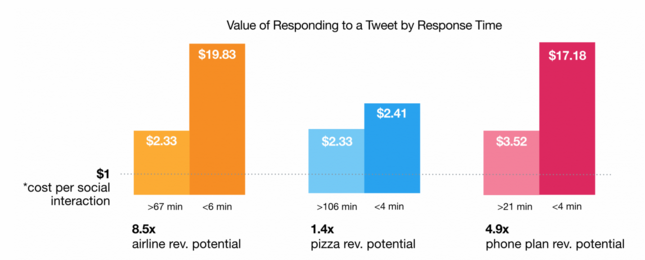Twitter Study Unsurprisingly Finds Using Twitter Is Good For Business Image courtesy of Tom Raftery
Weeks after Twitter rolled out a suite of new customer service tools for businesses using the social network to connect with clients, the company has come out with a not-at-all-shocking report that interacting with customers on Twitter is good for business. Flabbergasted? Probably not.
The study, which was conducted in partnership with Applied Marketing Science, is a continuation of a report released last year and aimed to figure out the potential revenue benefit to businesses — specifically those in the quick-service restaurant, telecom industries, and airline industry — who help their customers via Twitter.
In its release of the survey results, which is based on results from 4,000 users, Twitter humbly declared that “people love getting customer service from businesses on Twitter,” and this love often translates into dollar signs.
The report found that responding to customers on the site has a positive impact on their perception of companies, translating into a 3% to 20% increase in the amount they’re willing to spend on the same service.
Of course, it’s not surprising that working with a responsive company would make consumers want to do business with that brand again. But the report found that the quicker the response from a business, the more customers return.

Customers who received a faster response to Tweets were more likely to spend more with a business in the future.
When it came to airlines, the study found that a reply in under six minutes from a carrier increased the customer’s willingness to pay almost $20 more for a ticket from that airline in the future.
For the telecom industry, Twitter and Applied Marketing found that customers are willing to pay $17 more per month for a phone plan if they receive a reply within four minutes. Conversely, they are only willing to pay $3.52 more if they have to wait over 20 minutes.
The results of a fast response from a quick-service restaurant were much less telling. It didn’t matter whether the company replied within four minutes or more than 106 minutes, the customer was only willing to pay about $2 more for a pizza.
Twitter, of course, takes the time to remind businesses that they can assist in setting customer expectations by using its new support indicator and message button.
The report also found that responding to frustrated or negative customer complaints on Twitter increases the chance that clients will leave happy.
Of the people Twitter surveyed, 69% who Tweeted negative comments say they felt more favorable when a business replies to their concern.
These feelings, however, vary by industry. Among telecom customers, conversations that began with a negative Tweet resulted in higher brand favorability than compared to those whose original Tweet was positive.
Finally, the report found that customers who receive a response on Twitter are also 44% more likely to tell others about their experience, both online and offline.
Additionally, they are 30% more likely to recommend the business, and respond an entire point higher — 2.66 versus 3.66 — on customer satisfaction surveys.
Want more consumer news? Visit our parent organization, Consumer Reports, for the latest on scams, recalls, and other consumer issues.

